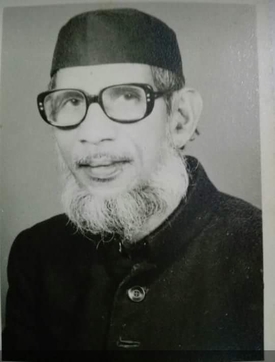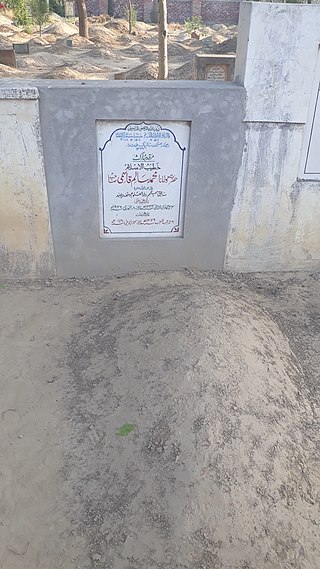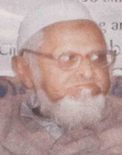Darul uloom, also spelled dar-ul-ulum, is an Arabic term that literally means "house of knowledge". The term generally means an Islamic seminary or educational institution – similar to or often the same as a madrassa or Islamic school – although a darul uloom often indicates a more advanced level of study. In a darul uloom, Islamic subjects are studied by students, who are known as talaba or ṭālib.
Bhatkal is a coastal town in the Uttara Kannada District of the Indian state of Karnataka. Bhatkal lies on National Highway 66, which runs between Mumbai and Kanyakumari, and has Bhatkal railway station which is one of the major railway stations along the Konkan Railway line, which runs between Mumbai and Mangalore.

Darul Uloom Nadwatul Ulama is an Islamic seminary in Lucknow, India. It was established by the Nadwatul Ulama, a council of Muslim scholars, on 26 September 1898.
Jamiatul Qasim Darul Uloom -il-Islamia is an Islamic seminary in India. The Jamia was established by Mufti Mahfoozur Rahman Usmani, an Islamic scholar of India. in 1989, Indo-Nepal border, in Supaul, Bihar. The Jamia also serves as a center for National Council for Promotion of Urdu Language and National Institute of Electronics & Information Technology.
Mohammad Rabey Hasani Nadwi was an Indian Sunni Islamic scholar, who served as the president of All India Muslim Personal Law Board and as the chancellor of Darul Uloom Nadwatul Ulama, an Islamic seminary in Lucknow, India. He was the patron of Islamic Fiqh Academy, the vice president of the Aalami Rabita Adab-e-Islami in Riyadh, and a founding member of the Muslim World League. He was regularly listed in the publication The 500 Most Influential Muslims. His disciples included Ijteba Nadwi.
Salman Husaini Nadwi is an Indian scholar and professor in the Islamic sciences. He is an author of numerous scholarly works in Arabic and Urdu. Salman Nadwi served as the Dean of the Faculty of Dawah at the Darul-uloom Nadwatul Ulama madrasa in Lucknow.

Darul Uloom Jamia Nizamia Ghousia is an Islamic seminary for Sunni Muslims. It was established by Mohammad Abdul Ghafoor Hazarvi, where he served as the Mohatmim and Grand Mufti. His son Mufti Abdul Shakoor Hazarvi took over as Mohatmim until April 2010. The Jamia is known for the great Ulama and Huffaz of Quran and Hadith it produced. It continues the tradition of the Darul uloom system initiated by Darul Uloom Bareily.
Sulṭān Zauq Nadvī is a Bangladeshi Islamic scholar, author and the founder of Jamia Darul Ma'arif Al-Islamia. He is known mainly for his expertise in and contribution to Arabic language and literature.

Nizāmuddīn Asīr Adrawi was an Indian Sunni Muslim scholar, biographer, historian and author in the Urdu language. He established Madrassa Darus Salam in Adari and served as Officer In Charge of Jamiat Ulama-e-Hind in Lucknow from 1974 to 1978.

Muhammad Salim Qasmi Siddiqi was an Indian Muslim scholar who co-founded the Darul Uloom Waqf in Deoband and served as its first rector. He was an alumnus of Darul Uloom Deoband. He received the fourth Shah Waliullah Award and was honoured with the Mark of Distinction from Egypt.
Zayn al-Abidin Sajjad Meerthi (1910–1991) was an Indian Sunni Muslim scholar and historian and head of the Islamic studies department of Jamia Millia Islamia. His book Tarikh-e-Millat is required reading in the syllabus of Darul Uloom Deoband and in madrasas affiliated with it.
Aziz-ul-Rahman Usmani was an Indian Sunni Muslim scholar who served as first Grand Mufti of Darul Uloom Deoband. He is best known for his Fatawa Darul Uloom Deoband. His brother was Shabbir Ahmad Usmani.

Zafeeruddin Miftāhi was an Indian Muslim scholar and jurist who served as a Mufti of Darul Uloom Deoband and the second president of Islamic Fiqh Academy. He compiled the religious verdicts of Azizur Rahman Usmani, called the Fatāwa Darul Uloom Deoband in twelve volumes and wrote books including Islām Ka Nizām-e-Masājid, Islām Ka Nizām Iffat-o-Asmat and Tārīkh-e-Masājid.

Muḥammad Ijteba Nadwi was an Indian Islamic scholar, who formerly headed the Arabic departments of Jamia Millia Islamia, Kashmir University and the Allahabad University.
Ahmad Hasan Amrohi was an Indian Muslim scholar and freedom struggle activist who served as the first principal of Madrasa Shahi in Moradabad. He was an alumnus of Darul Uloom Deoband and among the founding members of Mahmud Hasan Deobandi's Thamratut-Tarbiyat. He was an authorized disciple of Imdadullah Muhajir Makki.

This bibliography of Darul Uloom Deoband is a selected list of generally available scholarly resources related to Darul Uloom Deoband, a leading Islamic seminary and Muslim theological centre in India at which the Deobandi movement began, founded in 1866. It is one of the most influential reform movements in modern Islam. It created a largest network of satellite madrasas all over the world especially India, Bangladesh, Pakistan, Afghanistan neighboring countries in Asia and beyond, and as far afield as the Caribbean, South Africa, United Kingdom and the United States. Islamic Revival in British India: Deoband, 1860-1900 by Barbara D. Metcalf was the first major monograph specifically devoted to the institutional and intellectual history of Deoband. Syed Mehboob Rizwi wrote History of Darul Uloom Deoband in 1977 in 2 volumes. This list will include Books and theses written on Darul Uloom Deoband and articles published about Deoband in various journals, newspapers, encyclopedias, seminars, websites etc. in APA style. Only bibliography related to Darul Uloom Deoband will be included here, for Deobandi movement, see Bibliography of Deobandi Movement.

Wahīduzzamān Kairānawi (1930–1995) was an Indian Sunni Muslim scholar, author, and professor who specialised in Arabic. He spent around 27 years instructing Hadith and Arabic language at Darul Uloom Deoband.
Muhammad Ismail Katki was an Indian Islamic scholar and writer. He was associated with the Khatme Nabuwat movement in India, particularly in the state of Odisha. He served as the first Ameer-e-Shari'at of Imarat-e-Shar'ia Odisha and the third president of Jamiat Ulama Odisha.








